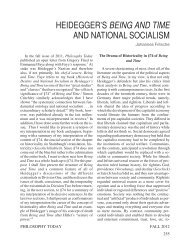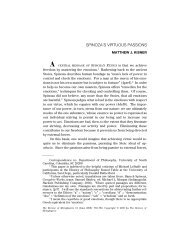Perverted Conversions: - Philosophy Documentation Center
Perverted Conversions: - Philosophy Documentation Center
Perverted Conversions: - Philosophy Documentation Center
You also want an ePaper? Increase the reach of your titles
YUMPU automatically turns print PDFs into web optimized ePapers that Google loves.
— 138 —<br />
Rachel Walsh<br />
• • •<br />
very location of the prison camps (outside the geographical body of the nation) and<br />
the extraordinary nature of the enemy combatants exceed the scope of the Geneva<br />
Conventions and allow for the suspension of habeas corpus.<br />
Yet the state of exception and the sovereign are less dependent upon the<br />
suspension of law, and more dependent upon the norms which already place certain<br />
bodies “outside of the political,” and which, consequently, easily assume the force<br />
of law as the law is suspended. In Judith Butler’s discussion of the resurgence of<br />
sovereignty in contemporary American politics, she observes that the re-emergence<br />
of sovereignty and the accompanying state of exception occurs in tandem with what<br />
Foucault identified in his later writings as governmentality, a form of power that<br />
operates through discourses and institutions but is never formally legitimated<br />
through established channels of authority. As Butler notes:<br />
The suspension of rule of law allows for the convergence of governmentality<br />
and sovereignty. . . . The state is neither identified with<br />
the acts of sovereignty nor with the field of governmentality, and<br />
yet both act in the name of the state. Law itself is either suspended,<br />
or regarded as an instrument . . . in constraining and monitoring a<br />
given population. 12<br />
Butler continues her discussion by noting that sovereign power is mainly exercised<br />
through “petty sovereigns” who, being affiliated with the bureaucracy rather than<br />
elected offices, wield their powers at their discretion. While Butler uncharacteristically<br />
makes only a passing reference to norms in her discussion of sovereign power and<br />
the suspension of law (she notes that the actions of petty sovereigns are obviously<br />
“conditioned”), her formulation invites an elaboration of how governmentality,<br />
which lends itself to sovereignty, both governs and is constituted by norms. For if<br />
governmentality is mainly characterized by its discursive and strategic (rules not laws)<br />
modalities of power, then that leads to the question: which discourses and norms<br />
allow for the suspension of law and subsequently come to rule in that lawless space?<br />
Agamben’s interventionist reading of Schmitt also invites these questions. In<br />
State of Exception he notes, just as Butler does, that the state of exception is more<br />
normative than exceptional, in terms of both the regularity with which it occurs and<br />
the means by which it is declared. Repeatedly punctuating the histories of European<br />
and American democracies, the state of exception emerges again and again during<br />
times of war as an indeterminate space in which the extraordinary facts demand the<br />
suspension of the law and acquire the force of law. As the “facts on the ground”<br />
that constitute the state of exception usurps the law, they signal the merging of<br />
exceptional facts with law. Agamben writes, “If it has been effectively said that in the<br />
12. Judith Butler, Precarious Life: The Powers of Mourning and Violence (New York: Verso<br />
Books, 2004), p. 55.

















